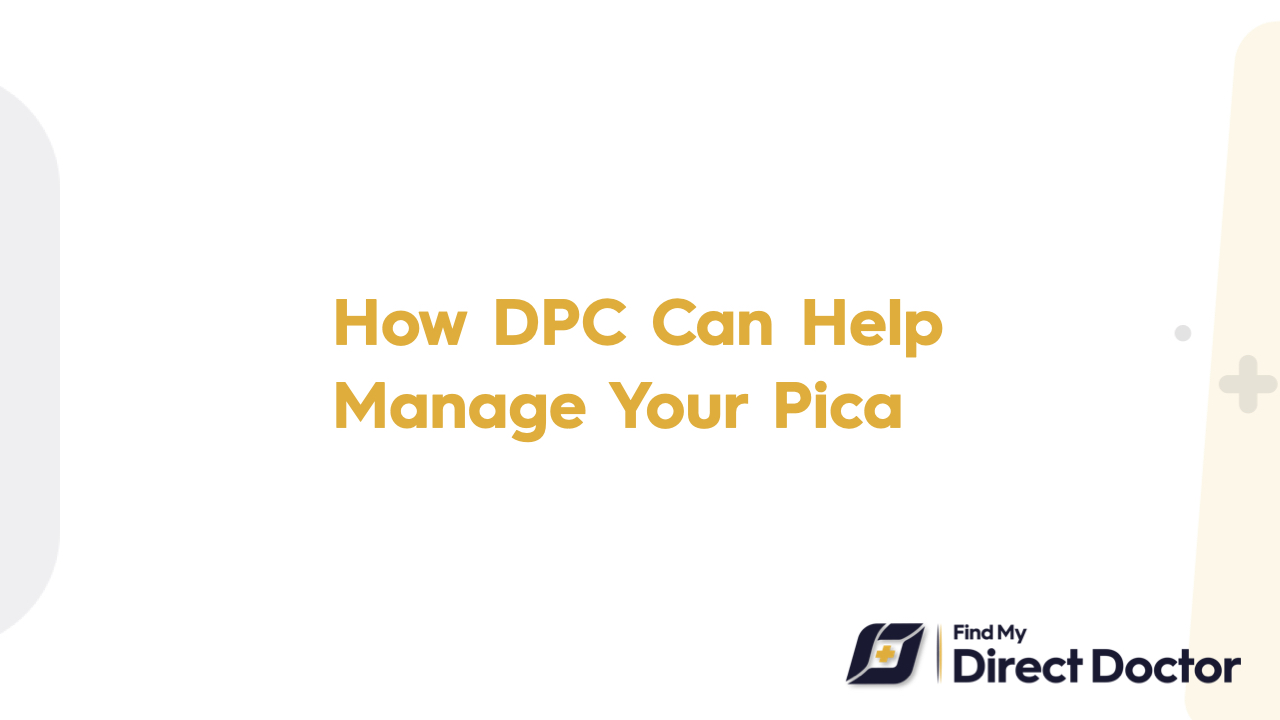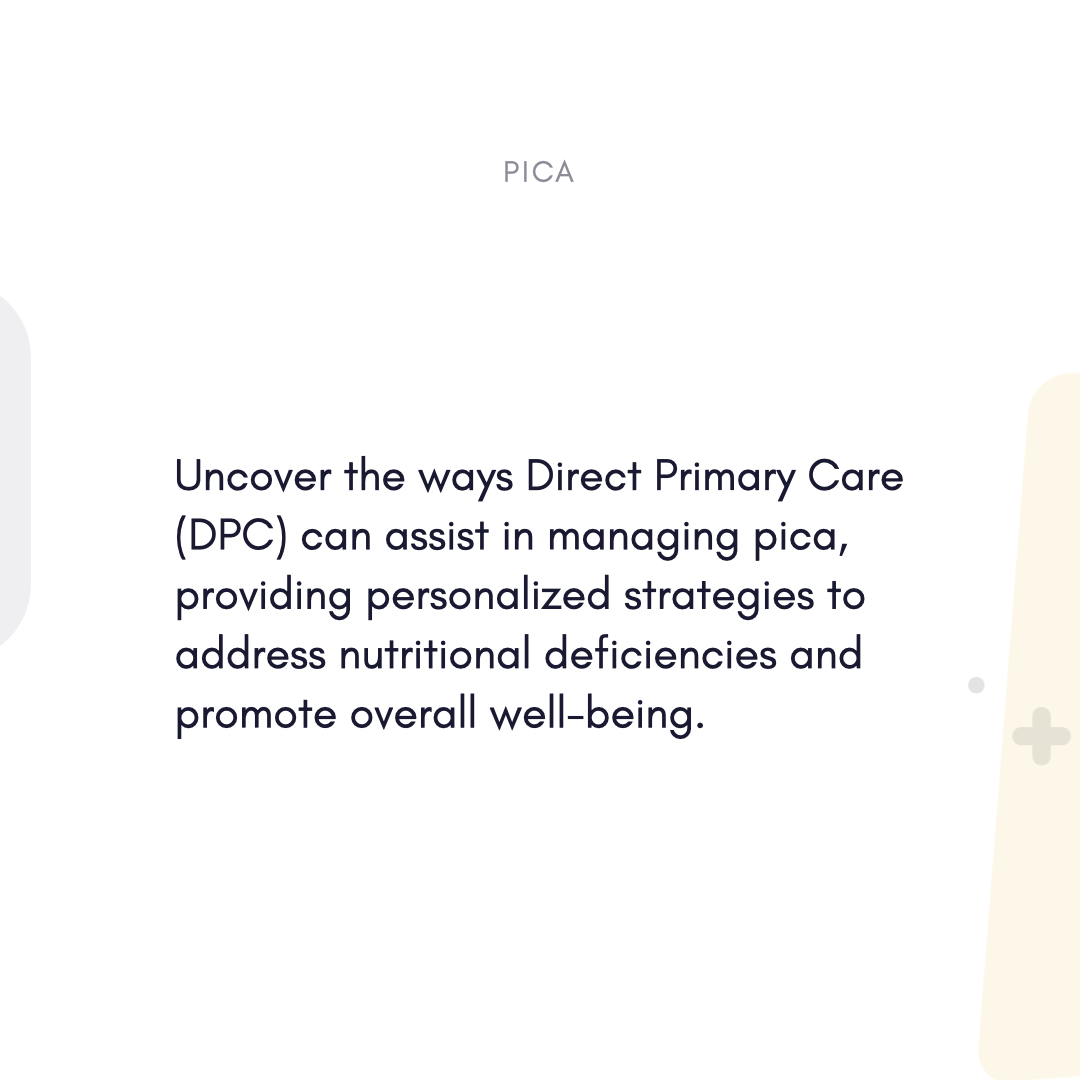Pica and Direct Primary Care (DPC): Compassionate Care to Break the Cycle of Non-Food Cravings
An unrelenting need to eat ice, chalk, or dirt. Shame that drives you to hide your needs. For millions of pica sufferers, this need to eat non-food products is not only perplexing but also dangerous for bowel problems, social isolation, and poisoning. Although conventional treatment sometimes writes off it as a phase or concentrates just on shortcomings, there is hope: Direct Primary Care (DPC) offers a judgment-free partnership to find underlying causes and restore health.

Knowing Pica
Pica is an eating disorder in which sufferers repeatedly seek and consume non-food items for more than one month. Typical consumables consist of:
- Geophagia, also known as clay or dirt,
- Ice-based pagophagia
- Amylophagia, sometimes known as raw starch
- Trichophagia—hair—involves
Essential hazards:
- Lead poisoning arising from paint chips
- Blockings of the intestines (hairballs, dirt)
- Dental malnourishment or damage
The American Psychiatric Association ties pica to cultural practices, pregnancy, iron shortage, or autism.
How DPC Changes Pica Therapy
Operating on a membership model usually 50–150 USD/month, Direct Primary Care (DPC) provides unlimited access to your physician for a set fee. For pica patients, this means no co-pays, no hurried visits, and a care plan as distinct as your cravings.
1. Quick Root Cause Analysis
The accessible approach of DPC guarantees:
- Same-day assessments for unexpected cravings or stomach discomfort.
- Affordable testing include stool analysis, iron/ferritin, zinc, lead levels.
- For severe anemia or chelation for lead toxicity, IV iron infusions are quick fixes.
2. Customized, Interdisciplinary Treatment
DPC doctors design customized plans in line with nutrition and psychiatric recommendations:
- Based on lab findings, either high-dose iron, zinc, or magnesium for nutrient repletion.
- Behavioral approaches include cognitive-behavioral therapy (CBT), distraction methods, or habit reversal training.
- Cultural sensitivity: Respectedly addressing customs of clay-eating in some societies.
3. Comprehensive, Economical Support
DPC helps to lower emotional and financial burden by:
- Cutting medicine costs: Iron pill or dewormer wholesale pricing.
- 24/7 telehealth access: At home, controlling GI symptoms or cravings.
- Family education: Encouragement of loved ones to substitute support for judgment.
DPC's Advantages for Pica Patients
1. Unmatched Attachability
- 24/7 text/phone access for a provider during craving episodes.
- Not waiting for dietitian or mental health referrals.
2. Customized Interventions
- Prenatal vitamins and cooling substitutes—such frozen fruit for ice cravings—help with pregnancy-related pica.
- OT coordination and sensory substitutions (chewable jewelry) linked to autism-related pica.
3. Open and Reasonable Cost
- Membership consists in consultations, labs, and care coordination—no hidden costs.
- Typical savings: 1,500+ USD yearly from multiple co-pays and ER avoidance for blockages.
Personal Success Stories from Real Life
- Maria, 24, during pregnancy yearned for laundry starch. Her DPC physician wrote IV iron prescriptions, diagnosed iron-deficiency anemia, and recommended frozen mango chunks. Two weeks later her appetite for starch disappeared.
- Case 2: 8-year-old autistic Liam ate paper obsessively. His DPC provider trained his parents in redirection techniques, set up OT for sensory tools, and recommended zinc supplements. In three months his pica cleared.
Typical Questions: Pica and DPC
- Q: Can DPC manage crises including lead poisoning?
- A: Indeed. Often at self-pay discounts, DPC doctors order stat lead tests, recommend chelation treatment, and coordinate toxicological consultations.
- Q: Can uninsured families afford DPC?
- A: Right away. Members avoid 3,000+ USD ER charges for bowel obstructions, save on labs and supplements.
- Should my child require a developmental specialist, what then?
- A: DPC doctor works with behavioral therapists and pediatric OTs to guarantee cash-pay rates.
Why DPC Wins for Pica Patients?
Emphasizing DPC's alignment with pica recommendations, the American Academy of Pediatrics supports:
- Treating deficiencies, not only cravings, should be the main emphasis.
- Tools to monitor triggers and honor development help to empower you.
- Trust: A safe place free from judgment to talk about embarrassing impulses.
Release the Grasp of Pica
Pica has no power over your life or definition of health. DPC helps you to acquire a partner who listens carefully, acts compassionately, and prepares you to heal—body and mind.






